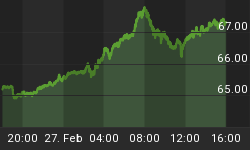Companies that make, move or peddle real stuff -- think Alcoa, Walmart, Caterpillar -- are having a hard time of it lately, mostly because their products and/or their customers have become commoditized. Aluminum is aluminum wherever it comes from, cheap Chinese clothes and toys can be had in any discount store, and earth moving equipment is only in demand when mining is hot. So these companies and their peers need generally-healthy consumers in order to thrive. And right now that's not the case.
The story is very different for Big Tech companies riding societal waves that are independent of trends in GDP, inflation, or consumer spending. They've created the best versions of things that the whole world wants and because of this can grow at high rates -- and earn serious money -- regardless of the state of the economy. Yesterday three of them reported earnings (all articles from CNBC):
Google parent Alphabet tops earnings estimates
Alphabet, the successor to and new parent company of Google, reported Google's pre-reorganization third-quarter earnings and revenue results on Thursday.
The company beat on both the top and bottom lines with earnings of $7.35 per share on revenue of $18.68 billion. Analysts had expected Alphabet to report earnings of about $7.21 per share on $18.53 billion in revenue, according to a consensus estimate from Thomson Reuters.
Alphabet also announced that its board had authorized a repurchase of up to $5,099,019,513.59 in Class C capital stock (5.099019514 is the square root of 26 -- the number of letters in the alphabet). Those shares, trading under the ticker GOOG, rose more than 11 percent in after-hours trade.
Class A shares in the company, meanwhile, jumped more than 9 percent in after-hours trading after the results were announced. With a current all-time high of $713.33, Alphabet shares above $740 would easily beat that record.
Amazon earnings: 17 cents per share vs expected loss of 13 cents
Amazon shares spiked Thursday after the high-spending company posted its second-straight quarterly profit, boosted by strong North American sales and cloud computing growth.
Amazon reported third-quarter earnings of 17 cents per share on $25.36 billion in revenue. Analysts expected Amazon to post a loss of 13 cents per share on $24.91 billion in revenue, according to a consensus estimate from Thomson Reuters.
Shares rose as much as 11 percent in extended trading. Their after-hours peak would beat the current all-time high reached in July and would equal gains of about 100 percent this year. (Click here to follow the stock.)
Microsoft earnings: 67 cents per share vs expected 59 cents
Microsoft delivered quarterly earnings and revenue that topped analysts' expectations on Thursday.
The technology giant posted earnings of 67 cents per share for the first quarter of its 2016 fiscal year, on revenue of $21.66 billion. Analysts had expected Microsoft to deliver quarterly earnings of 59 cents per share on $21.03 billion in revenue, according to consensus estimates by Thomson Reuters.
Shares were up more than 7 percent in extended-hours trade.
A handful of dominant tech companies won't save us from the financial crisis that excessive debt and general stupidity will soon bring on. Still, it's fun to see iconoclasts like Larry Page and Jeff Bezos change the world in mostly positive ways. And it's instructive to note that they created their companies here in the US, where some markets are still relatively free.















